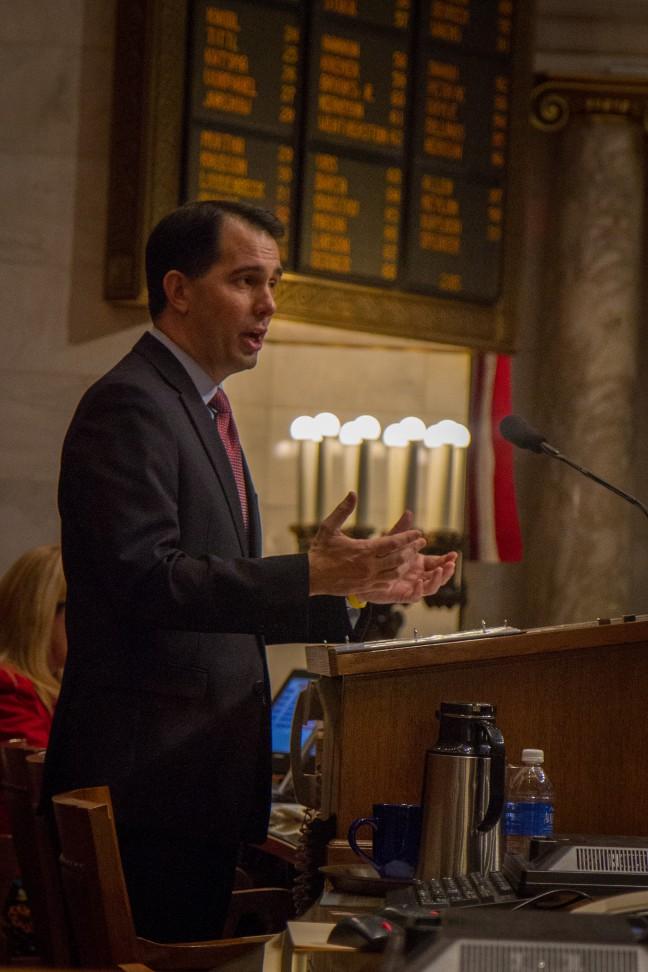If approved by the Republican Legislature, Gov. Scott Walker’s proposed budget would remove the enrollment cap in Wisconsin’s statewide school voucher program. Removing the enrollment cap in Wisconsin’s statewide school voucher program is not a viable long-term policy prescription for improving educational outcomes in the state.
In 1989, Wisconsin created the first modern school voucher program in the country. It allowed a certain amount of low-income students vouchers to attend private schools within Milwaukee. Wisconsin’s first school voucher program was limited in three significant ways. First, the school voucher program did not cover the entire state; it only covered the geographical area of Milwaukee. Second, the program was restricted to pupils whose families had limited financial means — specifically, to those families whose incomes were less than 175 percent of the federal poverty line. Third, the program had enrollment caps.
The program was touted as a way to help enable poverty-stricken Milwaukee students obtain a high quality education and thus, hopefully, improve their economic situation as adults. However, the purpose of school voucher programs in Wisconsin has shifted from its original purpose of helping poor students obtain better educational outcomes to promoting “parental choice.” However, the real purpose seems to be to facilitate the privatization of education. The evolution of Wisconsin’s school voucher programs since its inception demonstrates this fundamental shift.
In 2011, Wisconsin extended the geographical scope of the school voucher program to Racine and, in regards to Milwaukee students and schools, removed the enrollment cap in its entirety. Additionally, Wisconsin “raised the income threshold” for participating in the program “to 300 percent of the federal poverty level.” But the expansion of the program had just begun.
The 2013-15 budget created a new statewide school voucher program, which supplemented the programs that already existed in Milwaukee and Racine. Like the original Milwaukee school voucher program, the new statewide school voucher program had enrollment caps. The statewide program was limited to 500 students the first year and 1,000 students the second year.
Many speculated that the enrollment caps in the statewide voucher program would eventually be repealed. As then-state senator Dale Schultz warned, “We are only one budget away from opening the flood gates. It’s grown every single budget. By going statewide, you sort of legitimize the concept.” I also predicted the revocation of enrollment caps in the new statewide voucher program, writing in a 2013 column, “…There is no question that the statewide voucher program will have no enrollment caps; the only question is how soon the caps will be removed.” It looks like my prediction is about to come to fruition.
Many commentators argue that school voucher programs improve educational outcomes. However, school voucher programs are neither a necessary nor sufficient condition for doing so. While the removal of enrollment caps in the statewide voucher program will certainly facilitate both parents’ “choice” of which school their children will attend and the privatization of education, educational outcomes can be improved in other, more substantial ways.
It seems intuitive, but educational outcomes are better when schools have better teachers, regardless of whether they teach in private or public schools. For example, in Finland, the process for becoming a teacher is highly competitive. Teachers are required to have a master’s degree and, in terms of professional status, are on par with doctors and lawyers. Because of this extremely rigorous and competitive process, teachers are better and, as a result, students have better educational outcomes.
Walker’s proposed removal of enrollment caps in Wisconsin’s statewide school voucher program is not particularly surprising, especially given the history of the program as a whole. Although not surprising, it will not do anything to improve educational outcomes throughout Wisconsin. Students would be better off with the state scrapping the school voucher programs and focusing on how to get better teachers who are compensated fairly into the classroom.
Aaron Loudenslager (loudenslager@wisc.edu) is a third year law student.


